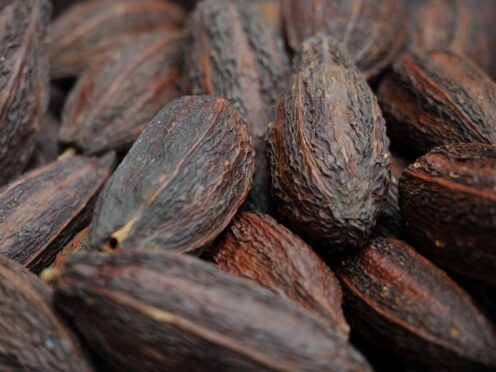The price of cocoa has soared ahead of Easter as the impacts of climate chance are worsened by conditions from the El Nino phenomenon, according to research.
The Energy and Climate Intelligence Unit (ECIU), an environmental non-profit, has set out how the combination of climate change and El Nino conditions have contributed to driving up cocoa prices ahead of the chocolate-heavy holiday on March 31.
The price of cocoa beans hit a record high of more than 8,200 dollars (approximately £6,500) per tonne this week – up from 2,600 dollars compared to this time last year.
It comes as the world’s largest cocoa exporters – Ivory Coast and Ghana – have been hit by extreme weather in recent months.
According to an analysis from the World Weather Attribution released on Thursday, climate change made the February heatwave in West Africa ten times more likely.
Ivory Coast and Ghana saw heavy rains in December 2023, with total precipitation more than double the 30-year average for the time of year, which affected yields due to issues like cocoa plants rotting with black pod disease.
The wet conditions were then followed by droughts typical of El Nino conditions in February, which further decimated yields due to cocoa being a drought-sensitive crop, the ECIU said.
In a report released on Thursday, the ECIU noted that the impacts of this volatile weather “has fed through to international commodity prices”.
Almost all cocoa globally – 99.9% – is grown in countries that are the most vulnerable and least well prepared to cope with worsening climate impacts, the ECIU said, citing data from the UN‘s Food and Agriculture Organisation.

It also synthesised UK Government trade data and University of Notre Dame’s Global Adaptation Index, finding that 58 million kilograms of cocoa beans worth £127m were imported to the UK directly from these countries, with 85% of all the UK’s cocoa beans coming from Ivory Coast alone.
Amber Sawyer, an ECIU analyst said farmers will need more support to protect their livelihoods and to keep the flow of cocoa beans – as well as other commodities like tea, bananas and rice – coming to the UK.
“Farmers in West Africa who grow the main ingredient, cocoa beans, of the Easter eggs many of us are looking forward to are struggling in the face of both extreme heat and extremes in rainfall,” she said.
“Wealthy nations like the UK can provide financial and technical support to developing countries to help their farmers better cope with these extremes.
“Ultimately, if we’re to stop these extremes getting ever worse, we have to reach net zero emissions.”
Meanwhile, Ben Clarke, research assistant on analysis and interpretation of Climate Data for Extreme Weather at the Grantham Institute, Imperial College London, said: “El Nino years often lead to challenges for farmers through changing patterns of weather.
“Increasingly, climate change, driven by fossil fuel use, is multiplying this natural challenge in many regions.
“It fuels more extreme conditions, devastates harvests, and makes food costs higher for all.”
Jon Walker, Fairtrade’s senior advisor for cocoa, said: “While high prices may seem like a windfall for farmers, once they eventually filter through to the farmgate, the underlying causes are worrying.
“Higher prices offset by lower productivity simply perpetuates the income insecurity that keeps farmers trapped in poverty and threatens the future of cocoa.
“It remains to be seen if supply will bounce back, or whether the current trend will be longer-lasting.
“To make progress on environmental and living income goals, stable minimum prices and long-term contracts between buyers and cocoa producers are necessary.”
El Nino, which is a cyclical natural phenomenon in the tropical eastern Pacific which brings heat to the surface, can add an extra warming effect to the atmosphere and oceans on top of that from global greenhouse gas emissions, which continue to rise.
The ECIU report warned that the combination is threatening other staple foods imported to the UK from affected countries, including rice from India, coffee from Vietnam, tea from Kenya, grapes from South Africa, bananas from Colombia and limes from Brazil.
